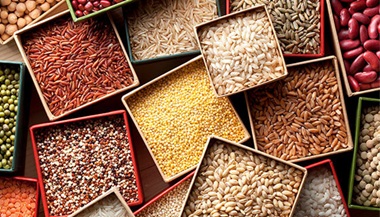Anti Inflammatory Diet
Chronic, systemic inflammation is a serious health concern that can be made worse — or better — with diet. Here’s what chronic inflammation is, and how what you eat can keep you safer from the chronic diseases inflammation can cause.
What is inflammation?
If you’ve ever cut your finger, bruised a toe or had a throat infection, you have likely experienced at least some of the four signs of inflammation: redness, swelling, pain and heat. Acute inflammation is your body’s natural response to illness, injury or infection and usually resolves on its own.
But there is another kind of inflammation ― the kind that affects the whole body ― which is called systemic. Systemic inflammation can become chronic; it can persist for months, or even years.
Chronic, systemic inflammation is a factor in diseases such as:
- Obesity
- Metabolic syndrome
- Prediabetes
- Type 2 diabetes
- Heart disease
- Inflammatory bowel disease, including Crohn’s disease and ulcerative colitis
- Some forms of cancer
- Arthritis
- Alzheimer’s disease
Inflammatory Foods
What causes inflammation? It can result from exposure to environmental toxins, a lingering virus, aging or chronic stress. But what you eat contributes, too.
What foods cause inflammation? Unfortunately, a lot of them. In particular, experts recommend avoiding these inflammatory foods:
- Red meat, such as steak and hamburgers
- Processed meat, such as bologna, bacon, sausage and lunchmeat
- Commercial baked goods such as snack cakes, pies, cookies and brownies
- Bread and pasta made with white flour
- Deep fried items such as French fries, fried chicken and donuts
- Foods high in added sugar, such as candy, jelly and syrup
- Sugar-sweetened beverages such as soda, bottled or canned tea drinks, and sports drinks
- Trans fats, found in margarine, microwave popcorn, refrigerated biscuits and dough, and nondairy coffee creamers
Cooking methods can make a difference
When you want to reduce inflammation, baking, steaming or fast stir-frying are preferable to deep frying or grilling.
Cooking meat, especially red meat, on the grill creates compounds associated with cancer. Meat on the grill can drip fat onto the flames and release these compounds, which can end up in the food on your plate. The same is not true of grilled vegetables or low-fat fish, which are safe (and delicious) on the grill.
And don’t feel bad about resorting to the microwave when you’re short on time. Microwaving cooks and heats by activating water molecules, and it is actually healthier than frying or grilling at high heat.
Also, bear in mind that the benefit of healthy items like fish and vegetables can be reversed if you are not careful with sauces and dressings. Many of these condiments and extras are high in inflammatory ingredients such as sugar and trans fat as well as sodium.
Processed Foods: Read the Label
It’s important to check the ingredients list of prepared or processed foods. Many prepared foods contain hidden sugar. It can be hard to tell, since sugar tends to assume aliases: By some estimates, there are over 50 names for added sugar in prepared commercial foods, such as “cane crystals” and “crystalized cane juice,” syrups and many ingredient names that ends in “ose” (chemical shorthand for sugar).
Reading food labels is important. For instance, any food that lists partially hydrogenated oils as an ingredient should be avoided since these are trans fats.
Anti-inflammatory Foods
While there isn’t one specific anti-inflammatory diet, experts say overall healthy eating patterns can help you get rid of inflammation and stay healthier. In particular, they recommend some food types that can help bring inflammation down:
Omega-3 Fatty Acids
One form of these powerful inflammation fighters is found in fatty fish such as salmon, herring, mackerel, sardines, tuna, striped bass and anchovies. You can get the benefit from eating the fish or by taking fish oil supplements.
Vegetarians and vegans have options, too. Another form of omega-3 is plant based. Eating nuts and seeds and cooking with canola oil can supply these nutrients and vitamin E, another inflammation fighter.
Vitamin C
Ascorbic acid, also known as vitamin C, is a powerful antioxidant. Antioxidants help address cellular wear and tear that can set off inflammation.
You’ll find vitamin C in fruits and vegetables, which are the basis of a healthy diet. In addition to well-known vitamin C sources such as citrus fruit and juice, tasty bell peppers are also packed with the vitamin and may yield fewer calories.
Polyphenols
There is a reason why the Mediterranean diet and other healthy eating plans stress colorful, plant-based foods, whole grains and olive oil.
Polyphenols are naturally occurring compounds in these foods that protect the body from inflammation.
And you can get polyphenol power from your favorite pick-me-up: Coffee, tea and even dark chocolate are rich in these beneficial compounds.
Gut-Healthy Foods
A healthy population of beneficial bacteria (flora) in the intestines can help keep inflammation at bay. To cultivate healthy intestinal flora, enjoy plenty of foods rich in probiotics and prebiotics.
But keep in mind: Not all fermented foods have probiotics. Check the label and ensure that live microorganisms are listed in the ingredients. Yogurt and cottage cheese will have live active cultures noted on the packaging.
Prebiotics, in the form of dietary fiber, are like food for the helpful bacteria. Jerusalem artichokes and foods rich in inulin, such as asparagus, bananas and chicory, help keep the beneficial flora healthy and plentiful.
How to Reduce Inflammation: One Meal at a Time
In terms of well-known diets, the Mediterranean diet may be the most beneficial in helping people get inflammation under control. It emphasizes omega-3s, vitamin C, polyphenols, fiber-rich foods and other known inflammation fighters.
For those who want to start gradually, one strategy is substitution: finding alternatives to foods that cause inflammation. For example:
| Instead of... | Try: |
|---|---|
| Charcuterie boards | Vegetable slices with hummus |
| French fries | Baked sweet potatoes |
| Sauces with butter or cheese | Olive oil, vinegar and herbs |
| Grilled burgers | Grilled eggplant or portobello mushrooms |
| Bakery cakes and pies | Dark chocolate with raspberries or grilled peaches |
Inflammation: You Can Fight It
It can seem challenging at first to eat for lower inflammation with so many inflammatory foods commercially available, but over time, small changes can turn into lasting habits.
While no one food reduces inflammation, building a healthy, holistic dietary pattern can help lower your risk of inflammatory disease and transform your health.






